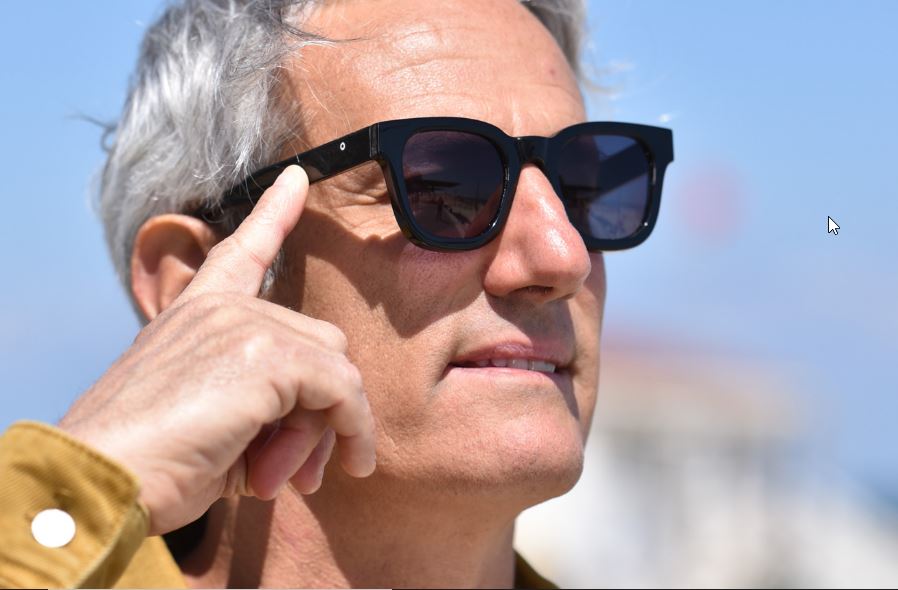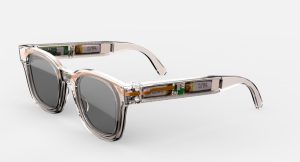
Will disruptive new technology spell relief for sufferers of presbyopia? With new smart lens technology from DeepOptics, an Israeli start up, wearers adjust the focus of their lenses with a simple swipe of a finger.
While adaptive focus lenses have made a significant investments in the past in attempts to establish a credible market beachhead, adjustable focus glasses remain a curious niche segment and have never quite gained a serious market position.
New Tech and Big Backers Could Make the Difference
DeepOptics has refined the use of liquid crystal technology in adaptive lenses to come up with their 32°N sunglasses, a sleek solution ready for the commercial market.
Funding and support from Essilor and Samsung Ventures have given DeepOptics a strong foundation on which to produce the glasses at scale and increase the probability of marketing success.
Eye Care Business Canada recently spoke to CEO and co-founder Yariv Hadad about the development and funding process. Here’s what’s next for DeepOptics.
The Shift Towards Smart Eyewear
Hadad already had several years of experience working in high-tech R&D companies before he founded DeepOptics in 2011.
While working as the Director of Imaging at Dblur Technologies, he met his future co-founders. When they started the company, their research began as an investigation into technology to improve focus for 3D TVs. However, once they found a tech solution for the glass display, they shifted efforts towards applying it to eyewear instead.
Currently, AR gaming is one of the key market drivers for smart glasses, but Hadad worked towards developing a product for people who need reading glasses.
DeepOptics’ first product, 32°N, uses pixelated Liquid Crystal technology to switch the focus of the lenses, allowing an unlimited number of optical lenses to materialize in the same frames.
Wearers can swipe the side of the glasses to switch between “reading mode” for close up focus, and “scenic mode” for long-distance focus. They can also personalize the settings of the glasses with an app, for a reading magnification that matches their needs.

DeepOptics’ Product Launch
DeepOptics’ 32°N sunglasses recently launched on Kickstarter on June 15. The product was fully backed in just a few hours, ultimately raising $314,852 from 1,204 backers.
Hadad plans on bringing the product to stores next year, with the first 32°N glasses commercially available in the US in the last quarter of 2022. However, he isn’t sure whether they will be available in Canada at the same time, or later.
There are already a few competitors in the space using Liquid Crystal technology for their lenses as well, but Hadad says DeepOptics has some key technological advantages that make their solution more flexible: “Our lens is built from pixels—millions of tiny elements that can be controlled to form all kinds of lenses. We can realize plus or minus lenses, or control the diameter and centre of the lens.
This advantage is even more significant when the technology is combined with an eye tracker and can position the lens dynamically in the direction of the user’s gaze. It gives us a wide range of possible solutions.”
The Next Steps for DeepOptics
While the launch of 32°N glasses is an exciting accomplishment, 32°N glasses are just the beginning for DeepOptics. Hadad says that the company plans to roll out prescription-based dynamic focal lenses, and then clear dynamic focal lens glasses.
After that, they plan on releasing an automatic version of the eyewear that wearers won’t have to adjust manually: “Unlike 32°N, focal change will not be manual, but rather automatic and continuous. The glasses will have an integrated sensor to constantly assess the distance of interest and accommodate the dynamic lens accordingly.“
DeepOptics also has plans for a private label. Hadad said the company is negotiating with eyewear companies about branded eyewear powered by DeepOptics technology: “We believe our core competence is technology and hope to collaborate with as many glasses companies to offer glasses from well-known brands with new powers.”
North American Plans?
When asked specifically about North America, Hadad confirmed, “We plan to make 32°N commercially available in the US in the last quarter of 2022. We still can’t say if it’ll be available in Canada at that same time, or later.”
The Future: Fully Integrated Eyewear
Speaking to Tech Times, Hadad says he anticipates that the future of smart eyewear will be glasses that integrate adaptive lenses, AR technology, and headphones.
While the smart glasses market is still an emerging one, the future for prescription glasses is bright: “Dynamics is not only about people aging; we need different correction in different illumination, conditions, when we’re tired. The missing piece is the technology that really allows you to do dynamic correction. So the opportunities are endless. It’s not only about presbyopia, it’s about applying different corrections to different conditions, to different people, to different situations.”
The technology potentially changes the mind-set on buying new glasses, as wearers can update their prescription on the same device. For now, consumers will have to wait until next year to see 32°N sunglasses hit the market. Canadians, maybe longer.











